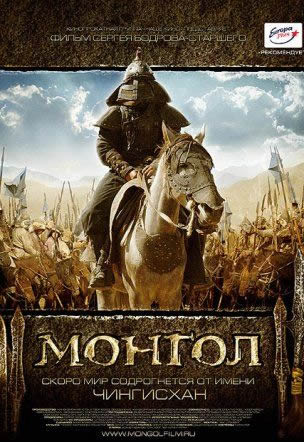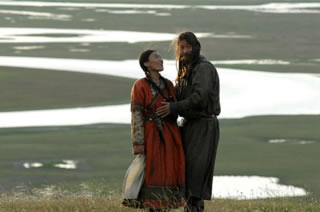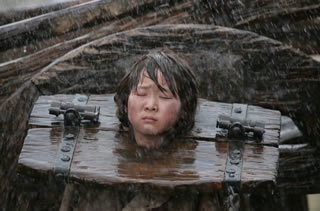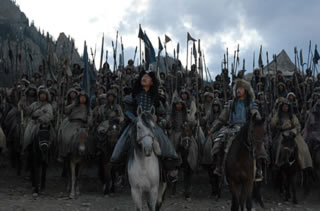Movies

New Releases • A-D • E-H • I-P • Q-Z • Articles • Festivals • Interviews • Dark Knight • Indiana Jones • MCU
Mongol
Directed by Sergei Bodrov
Rated R
Mongol is Kazakhstan's first Oscar nominee, for this year's Best Foreign Language Film, and it's a doozie of restorative cinema.
Temudgin of Mongolia

Following in the grand tradition of other biographical epics such as Lawrence of Arabia and Braveheart, Mongol tells the story of Temudgin, better known in large swathes of the world as Genghis Khan, and his rise to power.
Mongol parades onto the screen with a vengeance; it's presented with such finesse, the end result engenders a strong curiosity to learn more about the real-life man. Even a 1996 issue of National Geographic describes him as Mongolia's George Washington, and it's interesting to see the magazine feature photographs of the same gorgeous landscapes that, 12 years later, would be presented so magnificently on the big screen.
As with those other epics, undoubtedly there's at least a little bit of image enhancement going on here, a blurring of the fine line that sometimes separates the honorable from the controversial. A casual bit of research on Genghis Khan indicates this movie includes the standard amount of condensed characterization for practical storytelling purposes, some embellishment for greater drama, and plenty of artistic license, typically by way of mystical intervention.
Director Sergei Bodrov and co-writer Arif Aliyev have fashioned a good story out of relatively sparse historical documentation, but unquestionably Temudgin's legacy fosters a tremendous amount of pride among those living in his vast territorial boundaries. It's the kind of pride that's eager to rebut the satirical belittling Kazakhstan suffered at the hands of Borat: Cultural Learnings of America for Make Benefit Glorious Nation of Kazakhstan a couple years ago.
Blood and Brood

Temudgin and his wife, Borte.
Photo: Picturehouse
Mongol begins with a tweenage Temudgin traveling with his father, an honorable man who is leery of breaking customs, since doing so would turn the whole world upside down. He's also an old-school man who advises his son to maintain honesty, follow tradition, and pick as his bride a woman with strong legs.
In the wake of their meeting with another tribe, Temudgin's father is poisoned and Temudgin goes on to learn the hard way that what his father held dear was not universal.
To some, honor is something that can be taken advantage of. Some think a good horse is far more important than a good woman. As time goes by, however, Temudgin's father will actually be proved correct.
Bouncing from a childhood partially spent in slavery and in stocks to an adulthood partially spent in prison and plotting vengeance, this Genghis Khan is the most honorable of all men, a man's man.
Picture a 12th century Clint Eastwood or Russell Crowe as Temudgin repeatedly proves his mettle. When his new bride asks him why he doesn't want to touch her, he responds, "My touch will break you in two." When an adversary begs Temudgin, at knifepoint, to beg for his own life, Temudgin replies, "I'm not a beggar, brother."
Touch of Destiny

Young Temudgin held captive.

Temudgin rises to power.
Photos: Picturehouse
That sense of earnest bravado runs throughout Mongol and at times it's almost too much to bear. But Genghis Khan's over-the-top ruggedness is tempered by an effective use of mysticism, particularly when an old monk foresees the young Temudgin destroying the Tangut empire. Mongol presents the intersection where history and legend meet. It also sits snuggly at the crossroads of a three-star story and tremendous, four-star filmmaking.
With Mongols known to be a simple tribe who fear thunder, it's only natural that the warrior-king would face his first great military challenge in the midst of a thunderstorm. Temudgin (Japanese actor Tadanobu Asano, Zatoichi), out in the open of the Mongolian steppes, rises to the occasion since, without a place to hide, he could no longer live in fear. Cue the rain; cue the lightning; cue the thunder.
A survivor and a conqueror, Temudgin's ultimate quest is to see the day when everyone speaks Mongol. That's an outlandish idea for a people who, at the time, were widely shunned as a clan known only for stealing and killing children.
With a goal of Mongolian domination burned into his mind, Temudgin ultimately rises to power because he's an honorable man who treats his soldiers fairly. He preaches three key practices:
- Don't kill women or children.
- Don't forget your debts.
- Fight to the end.
Even now, some 900 years later, those are good values to live by, one and all.
• Originally published at MovieHabit.com.


